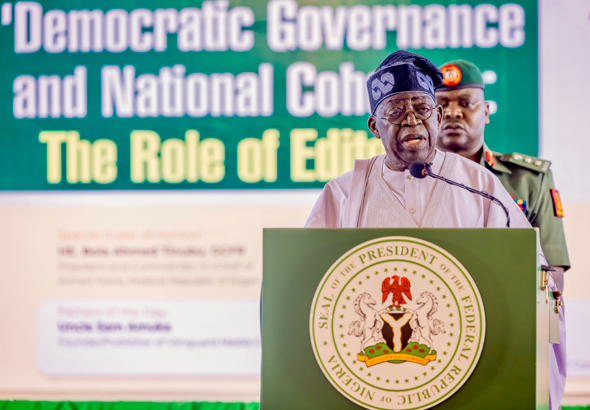President Bola Tinubu did the unexpected last Wednesday. He attended the Nigerian Guild of Editors (NGE) Conference 2025. It was the very first for any Nigerian president. Quite absurdly, the watchdog, the Nigerian press, willingly moved into the tiger’s buba – the lair – for deliberation on its welfare. Ayinla Ade-Gaitor, the Iganna, Ìwájòwà LGA of Oyo state-born Apala musician of the 1970s/80s fame, equally wondered at this quixotic equation. My compatriots, can a tiger and a dog cohabitate in the same lair? – “K’ájá ó dúró, k’ékùn ó dúró, ńjé yíó seé se, èyin alárá wa?” Ade-Gaitor asked in his melodious Iganna-flavoured voice.
But at the 21st NGE Annual Conference (ANEC) 2025 held in its lair – the Aso Rock State House Conference Centre in Abuja – the tiger and the dog became so giddy after clinking wine glasses, so much that they both shared titivating embraces. They had both been soused to their eyeballs. When it was time for the tiger to speak, clanking its incisors menacingly and magisterially, with recent blood dripping from its lips and caked blood stuck around its nose, this strange incest reminded me of Sir Kitoye Ajasa.
Ajasa (1866–1937) was a Nigerian lawyer from the Saro family migrants of Dahomey, present-day Benin Republic, which had existed from 1600 to 1904. He studied at the Inner Temple Inn of Court and was called to the bar in 1893. Ajasa was similarly a legislator during the colonial period. He was, however,
To achieve this persuasion, Ajasa became a newspaper founder. Of course, his Nigerian Pioneer newspaper, founded in 1914, the year of Nigeria’s birth, invited so much reproach. He deliberately founded it as a counterpoise to the radical Lagos Weekly Record newspaper of John Payne Jackson, which was a thorn in the flesh of the colonialists. Ajasa’s brand of journalism frowned at anti-government polemics as other papers of the time did. In return, the people of Lagos extremely distrusted it. In
Advertisement
The Weekly Record, unlike Ajasa’s, was uncompromising in its journalism crusade. It was so fierce that Governor-General
The Weekly Record newspaper, however, had a remarkably long existence, spanning forty years, that is, 1891–1930. After Jackson’s death in 1918, his son, Thomas Horatius Jackson, took over the running of the newspaper.
To demonstrate their opprobrium for Ajasa’s leaflet, the Nigerian Pioneer newspaper, the people scoffed at it on the newsstand. To Ajasa’s contemporaries, his lickspittling was bothersome. They could not fathom his boot-licking
Advertisement
Ajasa’s newspaper itself became more or less the unofficial bulletin of the colonial government. It publicly mocked nationalists who fought for development, and in a particular case, in the 1916 Lagos water rate protest against the colonial government, Ajasa labelled
Ajasa, in 1906, became an unofficial member of the Legislative Council. In 1914, he was made a member of Lugard’s Nigerian Council. He later became a judge of the High Court of Lagos, Officer of the Order of the British Empire and knighted as ‘Knight Bachelor’, becoming the first Nigerian to be so honoured by the British. He was in the Nigerian parliament till 1933, and shortly after 1937, when he died, the Nigerian Pioneer died.
So, when on Wednesday, President Tinubu urged the Nigerian media to “report boldly, but do so truthfully; critique government policy but do so with knowledge and fairness. Your aim must never be to tear down, but to help build a better society,” my mind told me that that fluid and racy speech was for the klieg. In actual fact, the president wanted Kitoye Ajasa-reincarnates for journalists, an Ajitóoba-phlegm-eater – media conscripts who would blind their eyes to the government’s wobbly feet at the national parade. Just as Kitoye Ajasa did for Frederick Lugard and the British colonial lords.
Since Lugard, the Kitoye Adisa-kind press had always been the preference of governments thereafter. Ever since the establishment of the Nigerian Daily Times on June 1, 1926 and even prior, the Nigerian press and Nigerians themselves had always been thirsty for adversarial journalism as a weapon of combating the colonial government. By 1937, when Nnamdi Azikiwe came with his West African Pilot, and 1949, when the Nigerian Tribune came on board, ordinary Nigerians had begun to salivate for a press that would stand up to their self-serving colonial governments and native inheritors of their seats who jointly treated Nigerian people with disdain. Nigerian media’s treatment of news became binary: it was either they were for the people against the government, or against the people, but in romance with the government, like Kitoye Ajasa’s.
Advertisement
Since the Muhammadu Buhari government, the Nigerian media has operated under a very precarious situation. Its first blow was economic. As Eze Anaba, the editors’ president, said, the Nigerian democracy, resilient through the ages, is currently under the bayonet of “insecurity, economic hardship, misinformation, and declining public trust in institutions, (as well as) government officials’ intolerance, sometimes, to freedom of the press.” The gravamen of Anaba’s speech can be found in his quip that “editors must therefore defend the sanctity of truth, insist on transparency, and hold power to account — not as adversaries of government, but as constructive partners in the pursuit of national progress.”
In what would look like a systematic but gradual decimation of the Nigerian press, governments have since 1999 corroded its powers. The ostensible
By 1999, when Nigeria returned power to civilians, the Nigerian press was still blistering. Its armaments were still potent, and practitioners retained their energy, which seemed to be bursting at its seams. Not long after the commencement of the Fourth Republic, the newspaper press made public examples of the carried-over rot of Nigeria’s governmental dysfunctionality. One after the other, even at a time when its tools were analogue, the press made mincemeat of public officers who, as it was later revealed, were evil doppelgängers of what they claimed to be in public. Salisu Buhari, the young Kano state legislator, who became speaker of the house of representatives, had his bubble burst. So also did Evan Enwerem. But for his street craftiness, the man who is the Nigerian president today would have been drowned by that hyper-ventilating press energy of the early 4th Republic.
The press of this period’s investigative acumen was top-notch and it could compete with any newspaper press anywhere in the world. My hunch is that, alarmed by the enormous power at its disposal and the system-purifying but dirty people-destroying powers
Advertisement
Today, the Nigerian newspaper press has been so mercilessly drubbed that it barely exists. Gradually, an underground and sustained shellacking was waged on it and what is left is its decimated carcass. Many of Nigeria’s erstwhile matador press houses, where the warriors who fought military rule to a standstill operated from, are desecrated and abandoned. Their print runs are caricatures of those noble eras when they proudly bore the tag “mass” in their media operations. Governments after governments since 1999 would seem to have deliberately jacked up the costs of running newspapers to the league of what you needed to procure nukes. The newsroom has emaciated so terribly that you would imagine it was afflicted by a weight-pining cancer.
Putting the ills that plague us in perspective, Daniel Nelson, former editor of The People of Ugandan newspaper, said, “What is noteworthy is not that a few papers have been born or that circulations have been going up, but that so few newspapers have been born and that sales have increased so little.” So also did William Hachten, a professor at the school of journalism in Wisconsin, whose verdict in Africa Report, with the title, ‘Newspaper in Africa: Change or Decay?’ was that, “Newspapers are still small and under-capitalized; circulations are limited and advertising revenue is sparse; production and distribution are both difficult and expensive; trained journalists are hard to come by, and potential readership is sharply restricted by illiteracy and poverty.”
Advertisement
Last Wednesday, I reckon that the tiger was happy that the watchdog had been finally castrated, can bark and cannot bite. It lay prostrate by its feet with a begging bowl. All those ills that plague the Nigerian media today, itemised by Anaba, the League’s president, are physical manifestations of a conquered press whose conquest is a product of gradual decimation. The graveyard of the print media is luxuriant with lofty memories.
Thanks to the broadcast and social media, which have both taken over the “mass” in print journalism’s erstwhile “mass media” pedigree. But for them, the Nigerian press would have today been a totally conquered battlefield. The watchdog must have entered the tiger’s lair last Wednesday, believing that the tiger’s smiles approximated its love for it. Truth be told, in the eyes of its newly acquired tiger friend, the press is a gourmet meal it has prepared for the dining table. Odolaye Aremu, Ilorin’s talented bard, once explained the danger in that emergency dalliance. “Adìye òpìpí” is the Yoruba name for a featherless hen which, in stature and outlook, bears striking resemblance to a hawk. The bard warned this hawk-lookalike hen to be wary of its newfound friendship with this carnivore, lest its entrails end in the belly of the raptor. Perhaps deceived that, being a media owner himself, like Odolaye’s òpìpí hen, the president is one of them, the Nigerian press, like this mistaken hen, would realize its folly too late when its flesh ends inside the hawk’s belly.
Advertisement
Any country of the world where the press and government are cosseted in such an amorous and adulterous relationship as we saw in Aso Rock last Wednesday has unilaterally tossed good governance out of its window. It reminds me of a paraphrase of a famous quote by US Supreme Court Justice, Hugo Black. In a concurring opinion for the landmark 1971 case of New York Times Co. v. United States, which is famously known as the Pentagon Papers case, Black wrote: “The press was protected so that it could bare the secrets of the government and inform the people. Only a free and unrestrained press can effectively expose deception in government. And paramount among the responsibilities of a free press is the duty to prevent any part of the government from deceiving the people.”
In that short quip, Black brings out the essential function of a free press which is to serve as a crucial check on government power. It should do this by investigating and revealing information the government would want hidden, but which is the responsibility of the press to expose. But, when the press deliberately hands itself over to government, what then happens?
Advertisement
The Nigerian press today lives in The Wailers’ archetypal concrete jungle. In this jungle, though there are no physical chains around its feet, it is not free. Three young Jamaican boys, which included Bob Marley, had in 1973, in their ‘Catch A Fire’ album, sang about the melancholic life of a wanderer which the Nigerian press found itself living today. Glory lost, barely living and now captive in the hands of the state, those young Jamaican boys’ melancholy is a fitting description of today’s press: “No sun will shine in my day today/The high yellow moon won’t come out to play/Darkness has covered my light…Where the living is harder (concrete jungle)/No chains around my feet but I’m not free/I know I am bound here in captivity…” they sang.
The only way the Nigerian media can play its rightful role in the success of democracy, especially the success of the Tinubu government, isn’t by sucking up to people in power or being their lapdog. A century after Kitoye Ajasa played his grovelling role to Lugard and British colonialists, history hasn’t forgotten him. It reserves a place for him till today. What will it say about us tomorrow?
Views expressed by contributors are strictly personal and not of TheCable.




